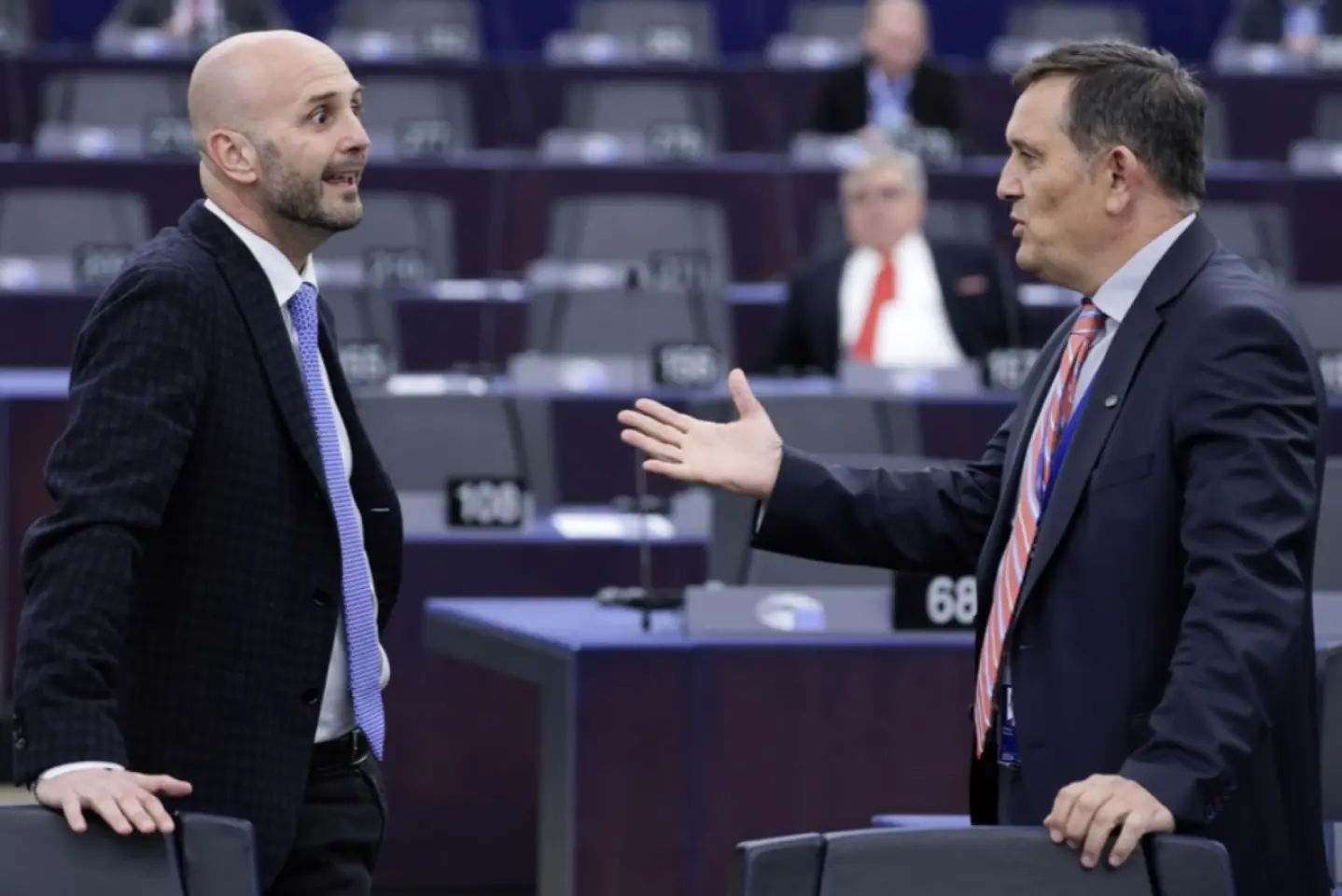
A ghost haunts the European Parliament: a vote of no-confidence has been filed against the von der Leyen Commission, a procedure last seen in 2014, at the time of the “Luxleaks” scandal facing the Juncker Commission. The chances of Ursula von der Leyen and her team being dismissed are very slim. Instead, on Monday, July 7, the Commission President will appear before MEPs, to take part in the debate preceding the vote. And the man responsible for this political coup is none other than AUR’s fake news champion, Gheorghe Piperea. The vote is scheduled for Thursday, July 10.
The reason behind this move is the so-called Pfizergate, the series of text messages the Commission President exchanged in 2021 with and Pfizer boss, Albert Bourla, at a time when the European Union was purchasing anti-COVID vaccines. Of course, such a thing can raise suspicion in the context in which the European Union spent over €71 billion on the vaccines in question, of which €21.5 billion went to Pfizer itself. The manner in which the said contracts were awarded should have been not only fair, but also fully transparent, and a “short thread” like the direct messages between the European Commission chief and the head of Pfizer looks completely shady in this context. The story is not at all new, it dates back to 2021, when The New York Times reported on the existence of the text messages. Subsequently, the American publication along with other media outlets asked the Commission president to disclose their content. Ursula von der Leyen has repeatedly resorted to third parties to refuse these requests, invoking technical reasons such as the fact that text messages are “ephemeral” communications that are not part of official Commission communication and should therefore simply be dismissed. In 2022, von der Leyen was faced with a critical resolution from the European Ombudsman, Emily O’Reily, who accused the European Commission of “maladministration” of the matter. In May 2025, the General Court of the European Union issued a ruling according to which the Commission did not give a credible explanation for the refusal to make the conversation public.
Consequently, at a first glance, Piperea’s vote of no-confidence seems like an attempt to bring back an older ghost and/or a populist action with zero chances of success, a predictable move for an extremist. However, there is more to this story than meets the eye: Ursula von der Leyen herself did not speak about the text messages and she generally avoided answering Parliament’s questions “in person” as much as possible. And that’s exactly what she will have to do in the public debate in Strasbourg scheduled for Monday, July 7, which precedes the vote on Thursday, July 10.
How Piperea collected the signatures
Before a vote of no-confidence can be called in the European Parliament, the signatures of 10% of the members of the legislature are required (72, in this case). In the first phase, Piperea announced he was relying on 74 signatures (according to sources in the European Parliament), which were collected with great effort, talking “person to person”. In fact, ECR, the group of Piperea and AUR are affiliated to, distanced itself from this initiative, after its spokesperson said “it is not an initiative of our group”. Later, there was talk of some of the signatures getting withdrawn, although eventually the motion was filed with a total of 79 MEPs backing it.
Who else should sign the motion, if not members of the ECR? This group only provides a total of 30 signatures and, curiously enough, patriots.eu/PFE (the so-called “sovereignists”) only contributed a few signatures. They are joined by non-affiliated MEPs such as Diana Șoșoacă and Luis Lazarus. According to certain sources, Viktor Orban's FIDESZ even refused to sign the document en masse, refusing to provide an explanation. However, Piperea’s initiative found support amidst the “most sovereignists of all sovereignists”, the so-called Europe of Sovereign Nations (ESN), founded by the Germans from the AfD after they were considered too toxic even by other European parties sharing their ideology.
The ECR's reluctance to back the vote of no-confidence can be attributed to information and speculation regarding the group’s efforts to gain respectability and its proximity to the “center” made up of the European People's Party (EPP), the Socialists (S&D) and Renew.
Whether we’re talking about 74 or 79 signatures, they are too few, and a vote of no confidence against the Von der Leyen II Commission is out of the question. Beyond the necessary political loyalty, Piperea's legal stunt will benefit almost all MEPs, given the reluctance of the Commission and its president to collaborate with European parties and the comparatively weak influence of Europe’s big “internationals” in Brussels' executive processes and policy initiatives. In other words, few MEPs will vote against Ursula von der Leyen, but many more will welcome her appearance in Parliament, for a long-overdue reckoning.
Political consequences
The fact that the debate in which the Commission president is supposed to give an explanation is scheduled for Monday evening, and the vote only on Thursday, is not inconsequential. The late hour and the reduced time slot on Monday tend to mitigate the impact of the entire procedure. And Thursday is the day of the week when MEPs can leave Strasbourg in peace, something they often do, because they only need to “check in” for three days (Monday-Wednesday) to be listed as present.
That doesn’t mean Monday will go unnoticed in across European media, more so than Thursday, when the outcome of the vote is fully predictable. What is important about this story is that tighter control of Parliament is not only convenient for its members, but also, ultimately, a democratic objective.
Of course, some positive perception will also be reflected on AUR, the party to which Piperea is affiliated, for which joining the more respectable ECR, instead of the more toxic groups to its right accused of Putinism, was a true feat after the Romanian party managed to enter the European Parliament in 2024. Whereas such an initiative from a figure on the fringe of politics would generate surprise in Romania, it is quite telling about the limitations of vision and action of “mainstream” politicians in Europe. As long as such limitations endure, European democracy is open to other similar surprises, and even remains at their mercy.


